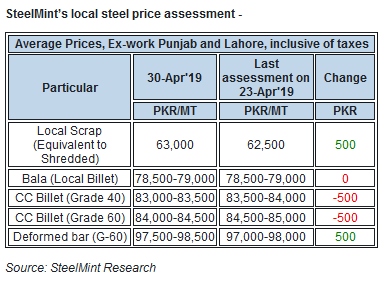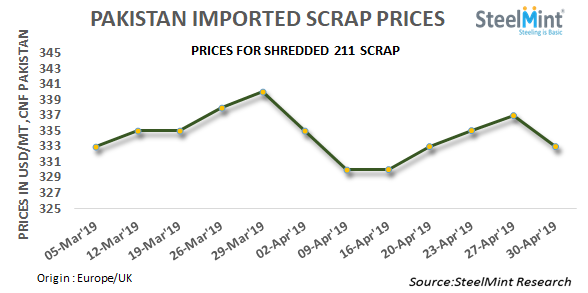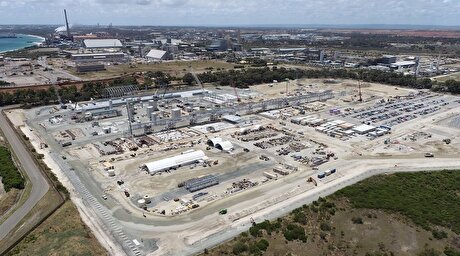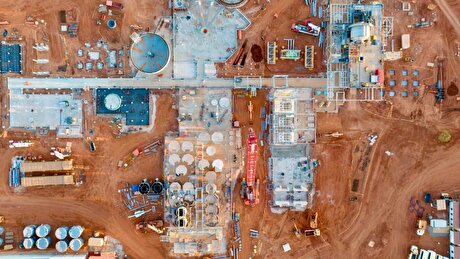
Pakistan: Imported Scrap Prices Soften Marginally; Trades Slow Down

Trades had picked up for Ramadan restocking at higher prices during the closing of last week, however, buying interest has started cooling off on nearing Ramadan month which usually turns market activities slow.
SteelMint’s assessment for containerized Shredded scrap stands at USD 332-335/MT, CFR Qasim, slightly down against USD 337-340/MT, CFR levels that were seen during closing last week.
“Global scrap prices seem under a bit pressure and participants expect further downside as May month to see a further slowdown in demand following the largest buyer, Turkey (also) will be going through Ramadan” shared a trader.
Several trades for Shredded scrap in containers from UK and Europe have been reported at around USD 332-335/MT, CFR Qasim.
Asking rates for Dubai HMS 1 stand still at around USD 335-337/MT, CFR depending on quality. In recent trades reported in containers, HMS 1 from Middle East concluded at USD 335/MT, CFR and from UK origin at USD 320/MT, CFR. South African HMS 1&2 traded at around USD 332-335/MT, CFR Qasim.
Local steel market lacks end consumer demand - Domestic market conditions are more-or-less the same since the past couple of weeks. With lesser construction activities and shortage of labor during Ramadam, end consumer demand for steel products is likely to remain low.
Domestic scrap prices at par with landed imported scrap - Domestic scrap prices equivalent to Shredded is being reported at PKR 63,000/MT (USD 445), ex-works inclusive of taxes, up by PKR 500/MT (USD 4) on W-o-W basis. Limited availability of domestic scrap might have supported scrap buyers to refill their inventories last week.
Billet and Rebar markets exhibit mixed sentiments, prices range bound - SteelMint’s assessment of local billet stands at PKR 78,500-79,000/MT (USD 554-558) ex-works. Rebar prices in Northern region reported at around PKR 97,500-98,500/MT that of Southern at PKR 98,500-99,500/MT, ex-works inclusive of local taxes. Participants believe that Pakistani Rupee to remain stable against US Dollar and sharp depreciation is less expected in the short term.




Caterpillar sees US tariff hit of up to $1.5 billion this year

Australia pledges $87M to rescue Trafigura’s Nyrstar smelters in critical minerals push

SAIL Bhilai Steel relies on Danieli proprietary technology to expand plate mill portfolio to higher steel grades

Alba Discloses its Financial Results for the Second Quarter and H1 of 2025

Fortuna rises on improved resource estimate for Senegal gold project

Tianqi Lithium Australia JV says it is prioritizing long-term viability of refinery

Fresnillo lifts gold forecast on strong first-half surge

Copper price slips as unwinding of tariff trade boosts LME stockpiles

Why did copper escape US tariffs when aluminum did not?

New research reveals source of world’s richest lithium deposits

Century Aluminum to invest $50M in Mt. Holly smelter restart in South Carolina

Australia to invest $33 million to boost Liontown’s Kathleen lithium operations

Glencore warns of cobalt surplus amid DRC export ban

SSR Mining soars on Q2 earnings beat

A Danieli greenfield project for competitive, quality rebar production

China limits supply of critical minerals to US defense sector: WSJ

Alba Hits 38 Million Safe Working Hours Without LTI

Advanced cold-rolled strip for China’s New Energy Vehicle market

Codelco seeks restart at Chilean copper mine after collapse

Century Aluminum to invest $50M in Mt. Holly smelter restart in South Carolina

Australia to invest $33 million to boost Liontown’s Kathleen lithium operations

Glencore warns of cobalt surplus amid DRC export ban

SSR Mining soars on Q2 earnings beat

A Danieli greenfield project for competitive, quality rebar production

China limits supply of critical minerals to US defense sector: WSJ

Alba Hits 38 Million Safe Working Hours Without LTI

Advanced cold-rolled strip for China’s New Energy Vehicle market

Codelco seeks restart at Chilean copper mine after collapse














